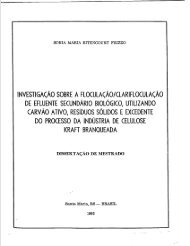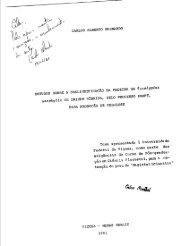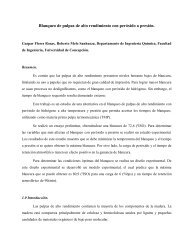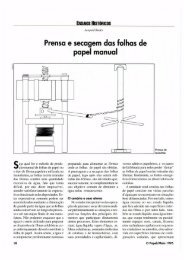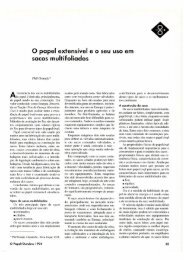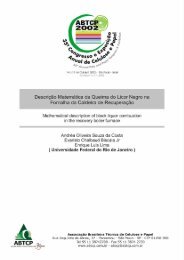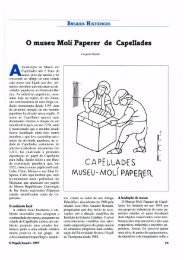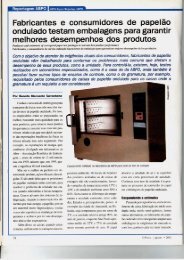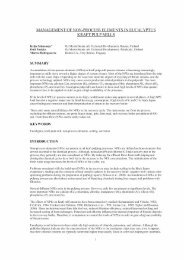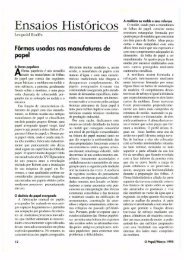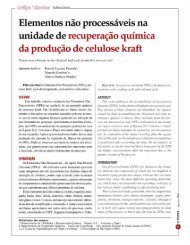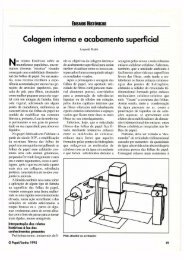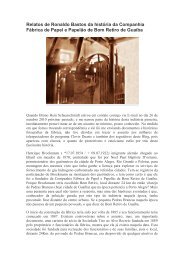O Eucalipto: um século no Brasil (The Eucalypt - Celso Foelkel
O Eucalipto: um século no Brasil (The Eucalypt - Celso Foelkel
O Eucalipto: um século no Brasil (The Eucalypt - Celso Foelkel
You also want an ePaper? Increase the reach of your titles
YUMPU automatically turns print PDFs into web optimized ePapers that Google loves.
Um <strong>século</strong> depois que Edmundo Navarro de Andrade informou oficialmente à Companhia<br />
Paulista de Estradas de Ferro que o eucalipto era a árvore indicada, a melhor opção para<br />
fornecer lenha re<strong>no</strong>vável nas imensas quantidades que as nascentes ferrovias cons<strong>um</strong>iam<br />
nas fornalhas de suas locomotivas, é tempo de resgatar a história brasileira da essência<br />
florestal originária da Austrália.<br />
De 1908 a 2008, <strong>um</strong> total de 3,5 milhões de hectares de terras brasileiras foram recobertos por<br />
florestas cultivadas de eucalipto. Eram terras quase sempre esgotadas pelo plantio do café e<br />
pelo uso como pastagens e que, com o eucalipto, passaram a gerar renda, emprego, tornando o<br />
<strong>Brasil</strong> o maior exportador de celulose de fibra curta do mundo e <strong>um</strong> dos grandes fabricantes de<br />
produtos industrializados a partir da madeira. Mais importante, talvez, os eucaliptais brasileiros<br />
absorvem 196 bilhões de toneladas de carbo<strong>no</strong>, o que é <strong>um</strong>a contribuição vital à campanha<br />
mundial para fazer com que o planeta continue habitável e se livre do pernicioso efeito estufa.<br />
Como outros vegetais ‘imigrados’, o café, a cana e a soja, também exóticos, que encontraram <strong>no</strong><br />
solo brasileiro as condições ideais para se propagarem, vale lembrar que o eucalipto se deu tão<br />
bem nas terras brasileiras que hoje praticamente todas as grandes indústrias de celulose e madeira<br />
do mundo estão presentes <strong>no</strong> <strong>Brasil</strong>, onde conseguem em seis a<strong>no</strong>s <strong>um</strong>a árvore em ponto<br />
de corte que, na Escandinávia e na América do Norte levaria setenta a<strong>no</strong>s para ser abatida.<br />
Acusado injustamente de “estragar” a terra, de cons<strong>um</strong>ir água em excesso, de gerar <strong>um</strong><br />
deserto verde, o eucalipto na realidade é <strong>um</strong> aliado na preservação das matas nativas. Os<br />
30 milhões de metros cúbicos de madeira de eucalipto que o <strong>Brasil</strong> utiliza a cada a<strong>no</strong>,<br />
teriam que ser conseguidos na Mata Atlântica, Floresta Amazônica, <strong>no</strong> Cerrado ou então<br />
com madeira importada, não fossem as florestas cultivadas.<br />
O eucalipto ajuda o <strong>Brasil</strong> sem fazer alarde. Modesto, não se anuncia <strong>no</strong>s pisos, <strong>no</strong>s<br />
móveis, <strong>no</strong>s mourões das cercas, dormentes nem <strong>no</strong>s livros que são produzidos a partir da<br />
matéria-prima que oferece. Esta obra é <strong>um</strong>a tentativa de resgatar a história dessa árvore<br />
que, de forma insuspeitada para muitos, tor<strong>no</strong>u-se parte integrante da vida do brasileiro e<br />
que, democrático, dá dinheiro tanto para a grande indústria, como para o peque<strong>no</strong> produtor,<br />
centenas de milhares deles, que plantam alguns poucos milhares de pés de eucalipto,<br />
“a minha poupança verde”, como disse <strong>um</strong> sitiante mineiro, com veia de poeta.<br />
Luiz Roberto de Souza Queiroz<br />
Luiz Ernesto George Barrichelo<br />
A century after Edmundo Navarro de Andrade officially informed the Companhia Paulista de<br />
Estradas de Ferro, a railway company, that eucalypt was the best option to supply renewable<br />
timber at the huge amounts the incipient railways used to cons<strong>um</strong>e in their locomotive furnaces,<br />
it is time to bring back the Brazilian history of the forest species originating in Australia.<br />
Between 1908 and 2008, a total of 3.5 million hectares of Brazilian land was recovered<br />
by planted eucalypt forests. <strong>The</strong>se were nearly always lands that had been depleted by<br />
coffee plantations and by use as pasture and which, with eucalypt, started generating<br />
income and jobs and turning Brazil into the world’s main short fiber pulp exporter and<br />
into one of the major wood-based industrialized product manufacturers. Moreover, it<br />
is believed the Brazilian eucalypts forests absorb 196 billion tons of carbon, a crucial<br />
contribution to the global campaign to allow the planet to continue inhabitable and<br />
free itself of the <strong>no</strong>xious greenhouse effect.<br />
As with other ‘immigrated’ plants, coffee, sugarcane and soybean, also exotic, which<br />
found ideal conditions to propagate on Brazilian soil, it is worthwhile to mention eucalypt<br />
did so well on Brazilian land that nearly all major global pulp and wood industries are<br />
in Brazil <strong>no</strong>w, where they can get a tree ready to be harvested in six years, something that<br />
would take seventy years to happen in Scandinavia and in North America.<br />
Unjustly accused of “ruining” the land, of cons<strong>um</strong>ing excessive amounts of water, of<br />
generating a green desert, in fact, eucalypt is an ally in the struggle to preserve native<br />
forests. <strong>The</strong> 30 million cubic meters of eucalypt wood Brazil uses each year would have<br />
to be extracted from the Atlantic Forest, from the Amazon Forest, from the “Cerrado”, or<br />
would otherwise have to be imported weren’t it for planted forests.<br />
<strong>Eucalypt</strong>s helps Brazil silently. Modest, it doesn’t an<strong>no</strong>unce its presence in flooring, furniture,<br />
fence posts, sleepers, or even in the books that are made out of the raw material<br />
it offers. This book is an attempt to recover the history of this tree which, unsuspected by<br />
many, has become an integral part of the Brazilian people’s life and which, democratic,<br />
generates cash, both for major industry and for small producers, hundreds of thousands<br />
of them, who plant a few thousand eucalypts trees, “my green savings,” as a small<br />
Minas Gerais farmer with the vein of a poet said.




